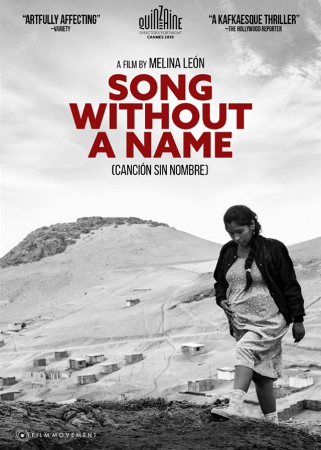
Song Without a Name (Canción sin nombre) 2019
Distributed by Film Movement
Produced by Melina León, Inti Briones, David White, et al.
Directed by Melina León
Streaming, 97 mins
College - General Adult
Discrimination; Human Trafficking; Native Peoples
Date Entered: 04/09/2021
Reviewed by Rachael Dreyer, Head of Research Services for Special Collections, Pennsylvania State UniversityA fictional depiction of actual events, as the opening credits indicate, Song Without a Name is told in black and white. The frame opens with images of newspaper stories, and then the story begins in a narrow frame, as if the viewer were watching the film on an old projector, the frame surrounded by black.
The film fictionalizes the nightmare that many Indigenous Peruvian women experienced in the 1980s: upon giving birth, their babies were taken from them and placed for international adoption. Georgina and her partner, Leo, are expecting their first child; Leo works as a laborer, hauling potatoes and Geo sits in the market selling potatoes by the kilo. When she hears an announcement over the radio, urging women who are pregnant and in need of assistance to call, Geo hurriedly writes down the clinic phone number. The viewer is filled with a sense of dread that not all is what it seems. After her child is taken at birth and the clinic vanishes, Geo and Leo attempt to file a police report. Without Peruvian ID numbers, the police will not help. The deep injustice of the situation permeates the narrative; the filmmaker uses these interactions to illustrate the failings and the corruption of a system that denies Indigenous people the rights and benefits of full citizenship while benefiting from their labor and continued marginalization.
Geo encounters a family friend, a journalist, Pedro while both are being arrested for curfew violations; he begins to unravel the mystery of a child-trafficking ring. Meanwhile, a secondary plot line emerges as Pedro falls for one of his neighbors, an actor starring in a local production of The Glass Menagerie. This liaison could be interpreted as a comment on the stigma of homosexuality in Peruvian society, or a signifier of Pedro’s liberal, progressive ideals, or of his outsider status (albeit different than Geo and Leo’s).
As Geo helps Pedro with his investigation, Leo is drawn into a rebel guerilla network, which we are left to assume is the Shining Path, but it’s never revealed with certainty. The attack in which Leo participates offers a critique of the Shining Path’s tactics: Leo and his peers are impoverished young people recruited to execute an attack on residents of the village in which they themselves live, who are also impoverished.
The film ends without full resolution, though the particular trafficking ring that Pedro exposes is disbanded and those involved are arrested. We watch evidence of the unraveling of Peru’s government, and we see the corruption evident throughout; we are shown poverty and desperation and the deep sorrow that comes from a child wrenched away. The film reminded this reviewer of Roma, released as a relative contemporary of Song Without a Name: the loss of a child, violence and social unrest, the exploitation of Indigenous women are all common themes. One of the highlights in an otherwise dark film, the music featured in several segments offer an emotional change of pace to refresh the audience.
This film will not be hurried; it’s best watched without other distractions, but some viewers may grow impatient with the speed at which the narrative moves.
Selected Awards:
Biarritz International Festival of Latin American Cinema, Jury Special Mention, 2019; Boston Film Festival, Best Narrative Film, 2019; Huelva Latin American Film Festival, Cinematography Award, Gold Colon Award, Silver Colon Award, Wofest Award, 2019.
Published and licensed under the Creative Commons Attribution 4.0 license. Anyone can use these reviews, so long as they comply with the terms of the license.